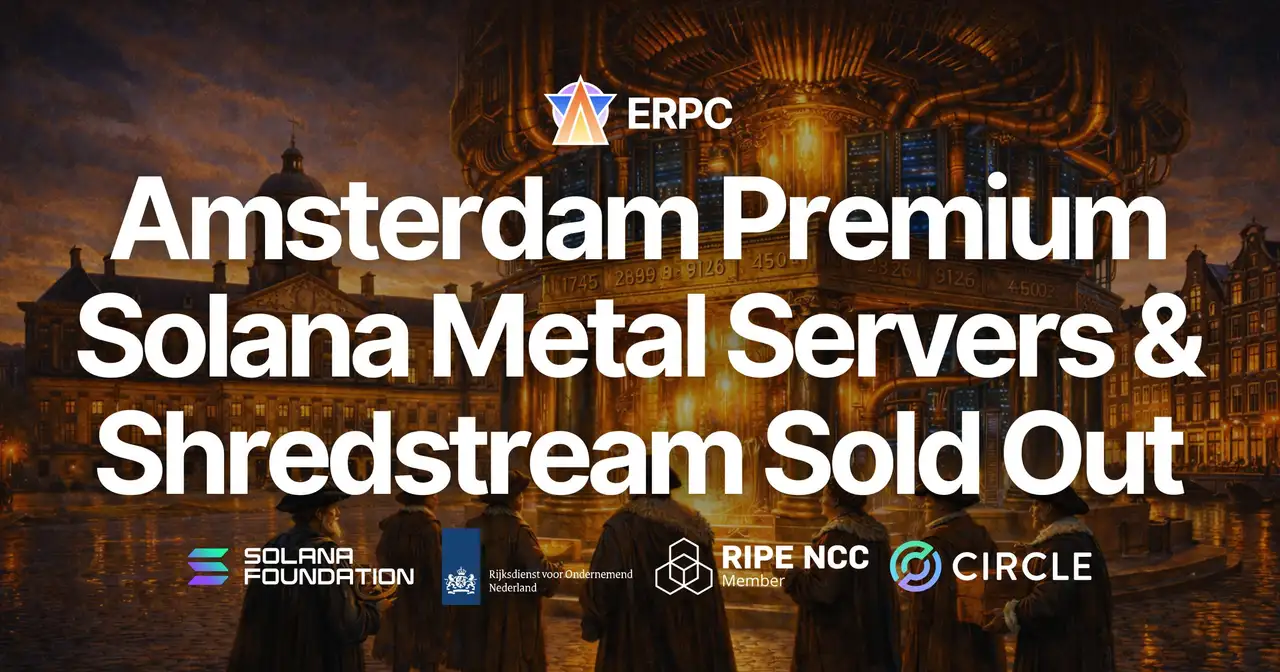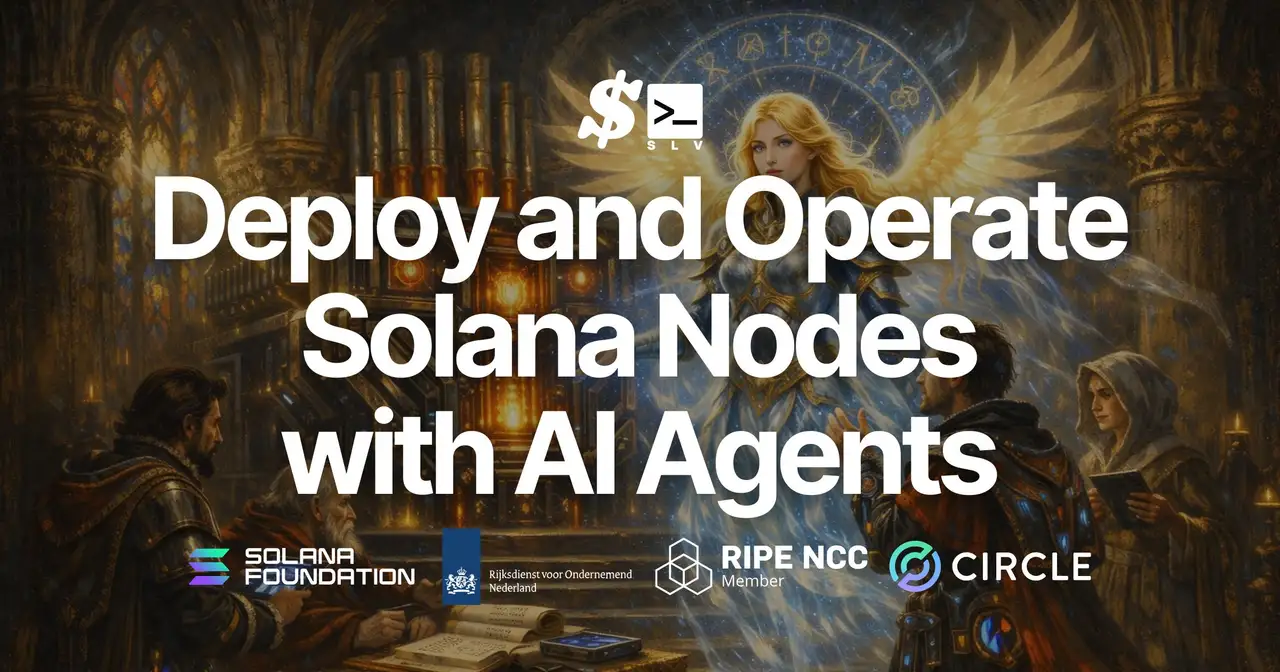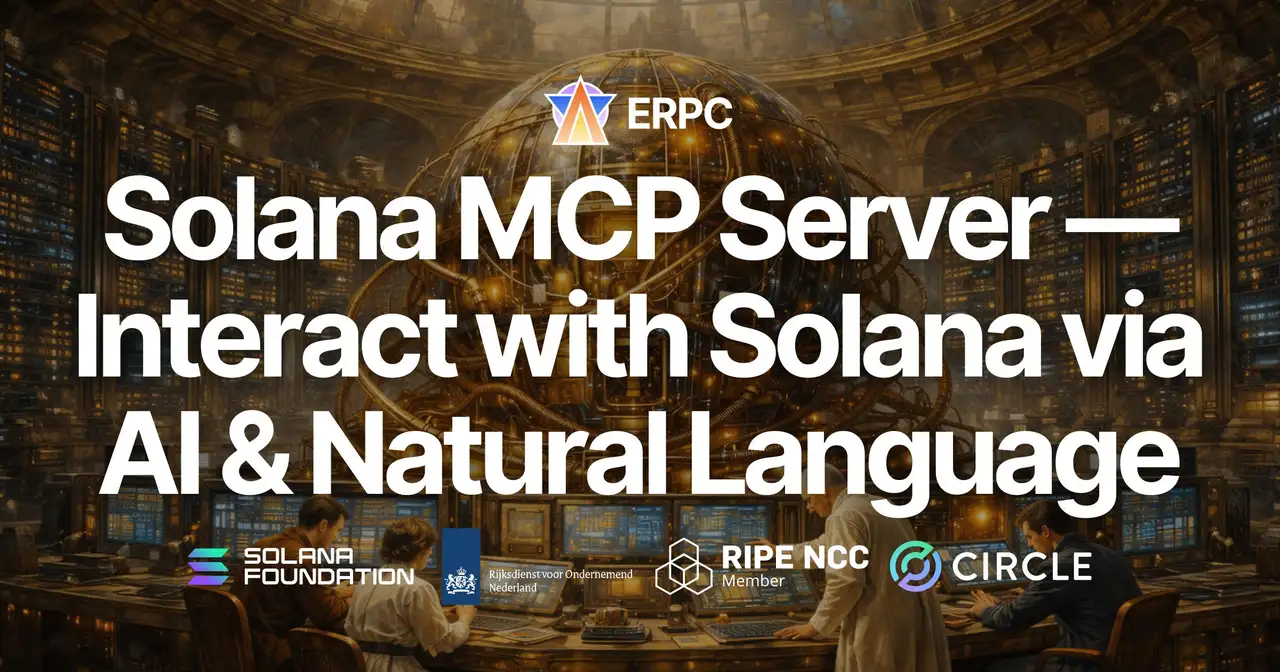ERPC Strengthens Defense Logic and Performance Across All Solana Shreds and gRPC Endpoints, Improving Low-Latency Performance Amid Rising Network Attacks
ERPC Strengthens Defense Logic and Performance Across All Solana Shreds and gRPC Endpoints, Improving Low-Latency Performance Amid Rising Network Attacks
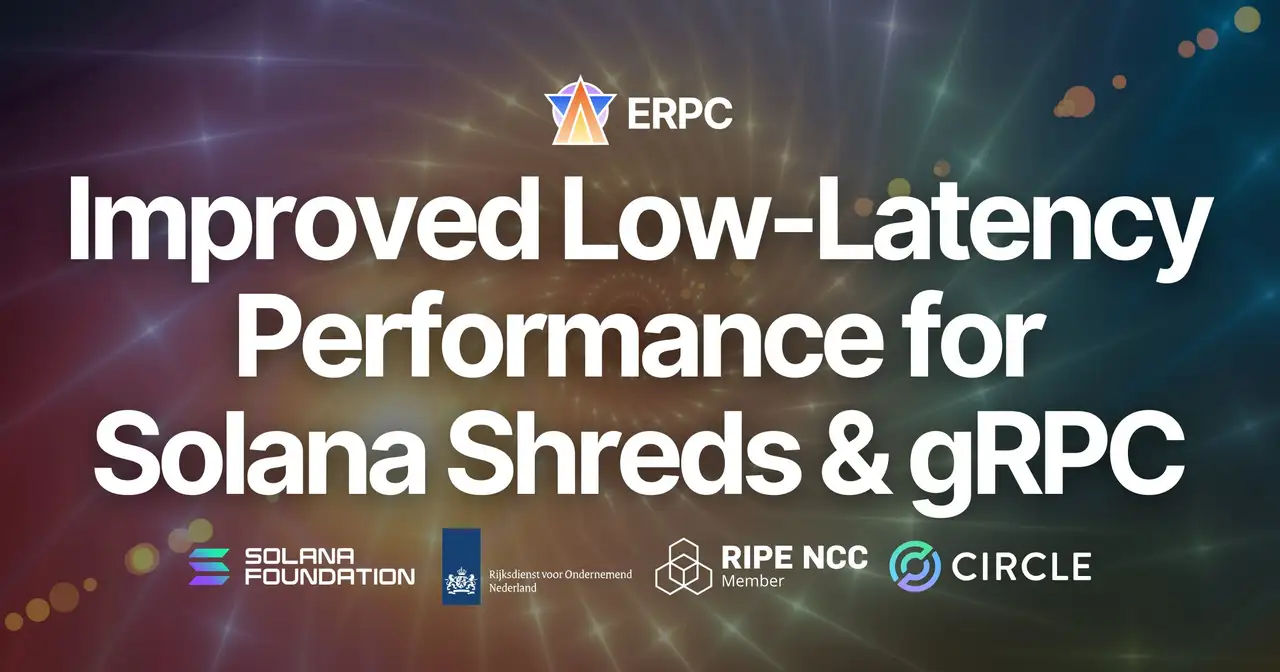
ELSOUL LABO B.V. (Headquarters: Amsterdam, Netherlands; CEO: Fumitake Kawasaki) and Validators DAO announce that ERPC has completed a major upgrade across all regional Shreds and Geyser gRPC endpoints, enhancing both defensive logic and performance simultaneously.
As Solana’s network scale continues to grow, attack traffic has been increasing in parallel. To safeguard normal traffic while further improving latency and stability, ERPC has strengthened nftables rules, minimized and optimized port structures, updated the Shreds software pipeline, and redesigned the feed architecture to gRPC nodes.
These improvements have resulted in measurable validator performance gains and increased Shreds/gRPC stability across all regions.
Growth of the Solana Network and Rising Attack Traffic
Solana’s ecosystem continues to expand across DeFi, NFTs, and trading bots, and overall network traffic has grown significantly year after year.
At the same time, concentrated DDoS-like access patterns and large volumes of invalid requests have also increased, requiring higher levels of defensive capability and traffic selection at both validator and RPC infrastructure layers.
At the same time, concentrated DDoS-like access patterns and large volumes of invalid requests have also increased, requiring higher levels of defensive capability and traffic selection at both validator and RPC infrastructure layers.
To address these evolving conditions, ERPC and Validators DAO continuously analyze logs, metrics, and validator score fluctuations observed during daily RPC and validator operations, applying tuning across the Shreds, gRPC, and RPC layers.
This update focuses on the most impactful improvements we identified: strengthening the defense logic, upgrading the Shreds distribution software, and optimizing the Shreds feed structure supplied to gRPC nodes. These enhancements have now been deployed across all regions.
Strengthened nftables and Port Minimization for Improved Defense and Load Balance
The update re-engineers the nftables-based network defense layer, introducing improvements such as:
- Minimizing unnecessary ports and optimizing port structure
- Reorganizing and tuning rule sets, improving match order
- Early blocking of attack signatures and suspicious traffic patterns
- Prioritizing legitimate traffic for Shreds, gRPC, and RPC
These changes strengthen defensive behavior while minimizing overhead for legitimate traffic.
By blocking attack and abnormal traffic earlier in the pipeline, backend Shreds and gRPC nodes carry less unnecessary load, improving request stability and latency under normal and high-load conditions.
By blocking attack and abnormal traffic earlier in the pipeline, backend Shreds and gRPC nodes carry less unnecessary load, improving request stability and latency under normal and high-load conditions.
Updated Shreds Distribution Software and Optimized Shreds Feeds to gRPC nodes
The Shreds distribution software has been upgraded with several performance optimizations.
This improves the efficiency of the Shreds receive, process, and forward pipeline, delivering higher throughput and lower latency on identical hardware.
This improves the efficiency of the Shreds receive, process, and forward pipeline, delivering higher throughput and lower latency on identical hardware.
In addition, the feed path and processing model for supplying Shreds to Geyser gRPC nodes have been redesigned, improving performance on the gRPC endpoints as well.
Optimizations at the Shreds layer flow directly into gRPC performance, providing significant benefits for workloads that rely on both streams in parallel.
Optimizations at the Shreds layer flow directly into gRPC performance, providing significant benefits for workloads that rely on both streams in parallel.
By reinforcing nftables, attack traffic can be blocked at the edge much earlier. Combined with the upgraded Shreds software and the optimized Shreds feeds into gRPC nodes, the system is now able to stay aligned with the latest blocks more consistently. This allows processing resources to be prioritized for legitimate traffic, achieving both reduced system load and improved overall performance.
Validator Performance Improvements

These upgrades have also led to measurable improvements for the Epics DAO validator operated by ERPC and Validators DAO.
-
Low Latency Vote score
Improved from the 99.90% range to approximately 99.95% -
Consensus Voting score
Improved from the 99.97% range to approximately 99.99%
By filtering invalid traffic earlier and ensuring stable bandwidth and processing resources for legitimate flows, vote-related traffic has become more consistent with reduced jitter.
These operational insights are applied not only to the validator, but also across Shreds, gRPC, and RPC layers, improving the ERPC platform as a whole.
These operational insights are applied not only to the validator, but also across Shreds, gRPC, and RPC layers, improving the ERPC platform as a whole.
Shreds and gRPC Performance Improvements Across All Regions
The update standardizes the following improvements across all ERPC regions:
- Enhanced Shreds processing via updated Shreds software
- Optimized Shreds-to-gRPC feed pipelines
- Strengthened defense logic using nftables
- Minimization and tuning of port structures and rule sets
As a result, Shreds and gRPC endpoints now show:
- Reduced slot gap occurrences
- More stable latency
- Fewer processing stalls under load
Global Proximity Data Sources and the DoubleZero Network
While many Shreds-related services rely primarily on Frankfurt (FRA) as a data source, ERPC utilizes globally distributed, proximity-optimized data sources.
Current ERPC Shreds and gRPC regions include:
- Amsterdam (AMS), Tokyo (TYO), New York (NY), Chicago (CHI), Salt Lake City (SLC), London (LON), Singapore (SGP), Frankfurt (FRA)
Network architecture:
- All regions support DoubleZero
- Direct proximity to Jito Block Engine and major Solana validators via same-network or PNI (Private Network Interconnect)
This design enables near-zero-distance access to data sources within each region, providing more uniform global latency and stability compared to single-region sourcing.
Unified Bundle Plans
ERPC provides a unified Bundle plan that integrates Solana RPC, Geyser gRPC, and Shredstream.
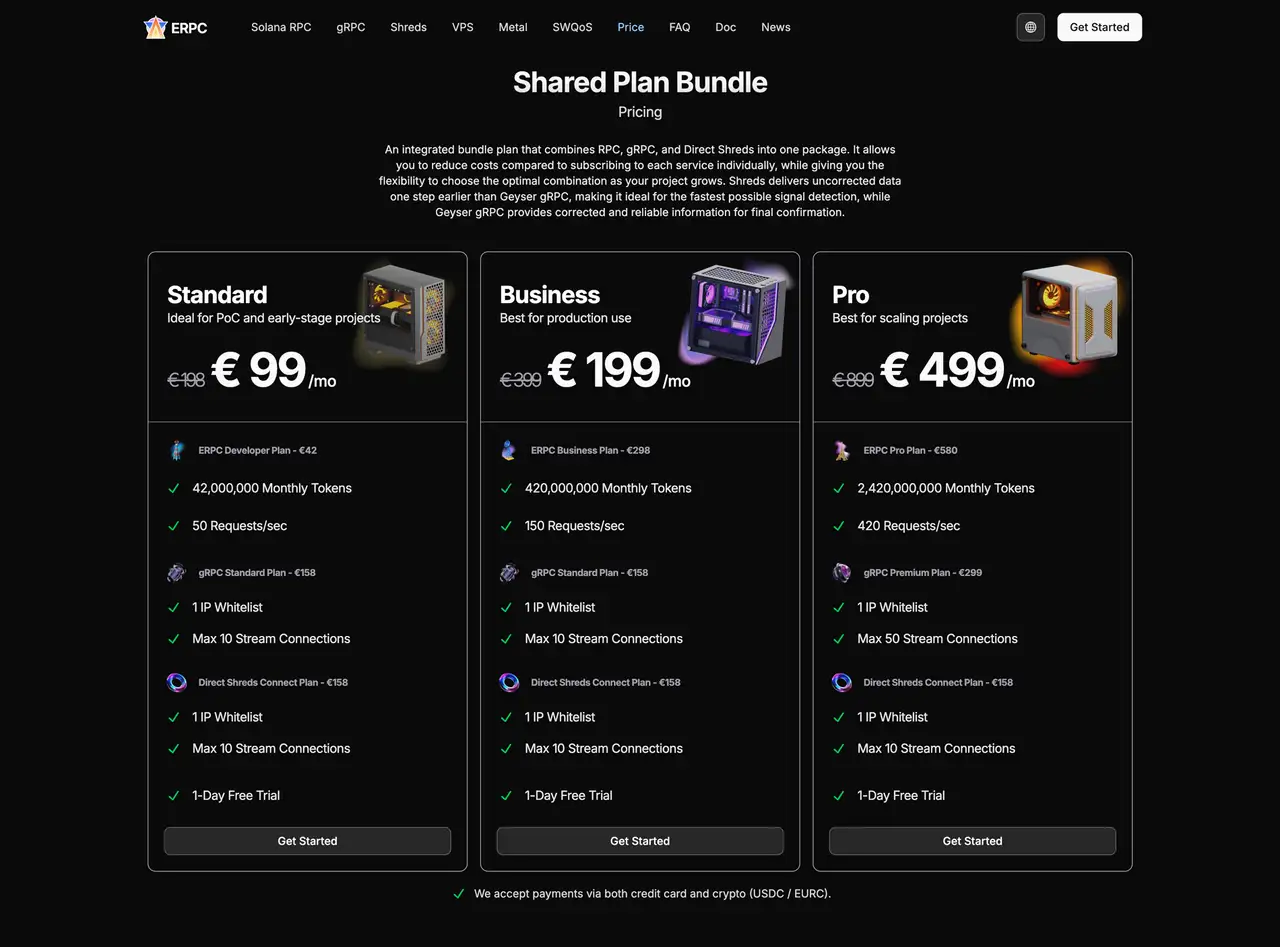
Each Bundle includes:
- Solana RPC (HTTP / WebSocket)
- Geyser gRPC (no filter restrictions)
- Shredstream gRPC
These endpoints operate within the same network, allowing trading bots and stream-processing applications to subscribe to multiple streams in parallel and automatically select the fastest route.
The recent defensive and performance upgrades have been applied across all Bundle endpoints in every region, delivering a consistent high-performance environment from development through production.
Zero-Distance Architecture with EPYC VPS / Premium Ryzen VPS
ERPC also provides VPS offerings within the same internal network as its RPC, gRPC, and Shredstream endpoints.
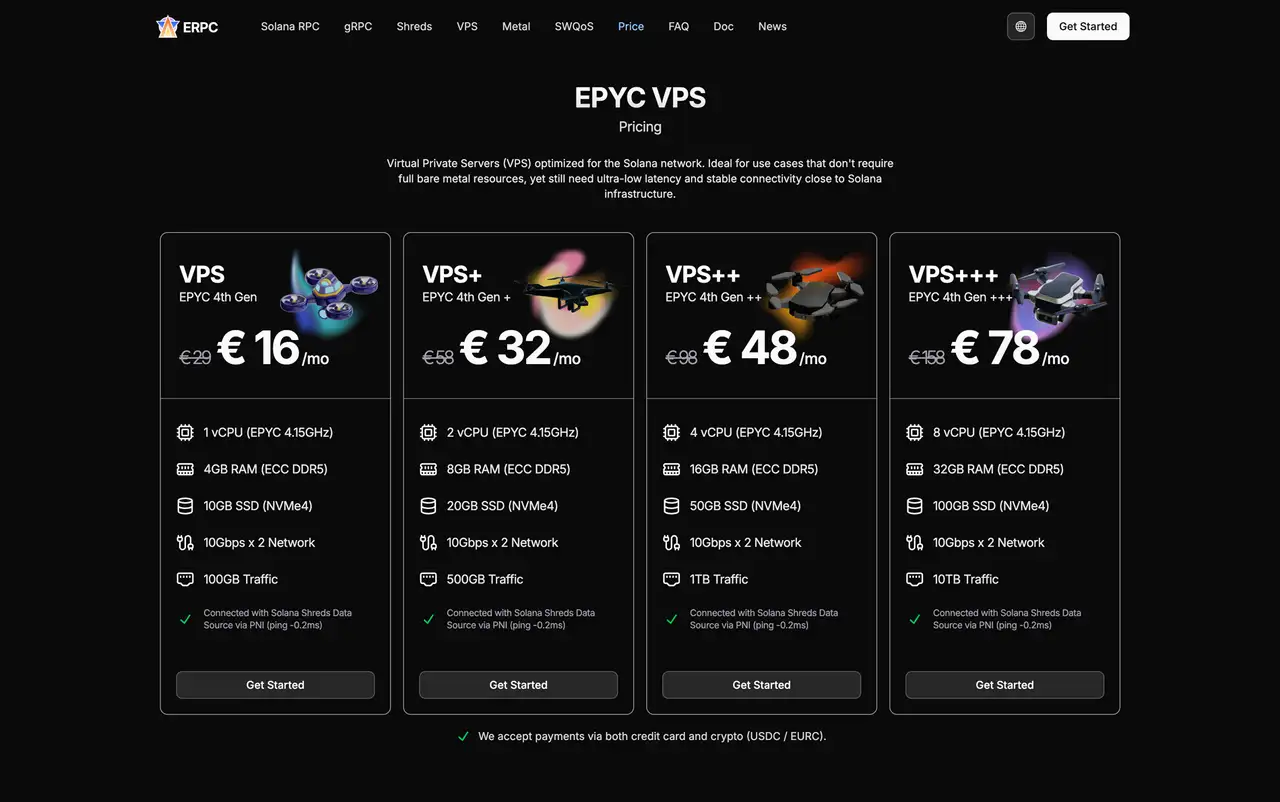
This includes cost-efficient EPYC VPS options and high-clock Premium Ryzen VPS configurations featuring 5.7GHz Ryzen CPUs.
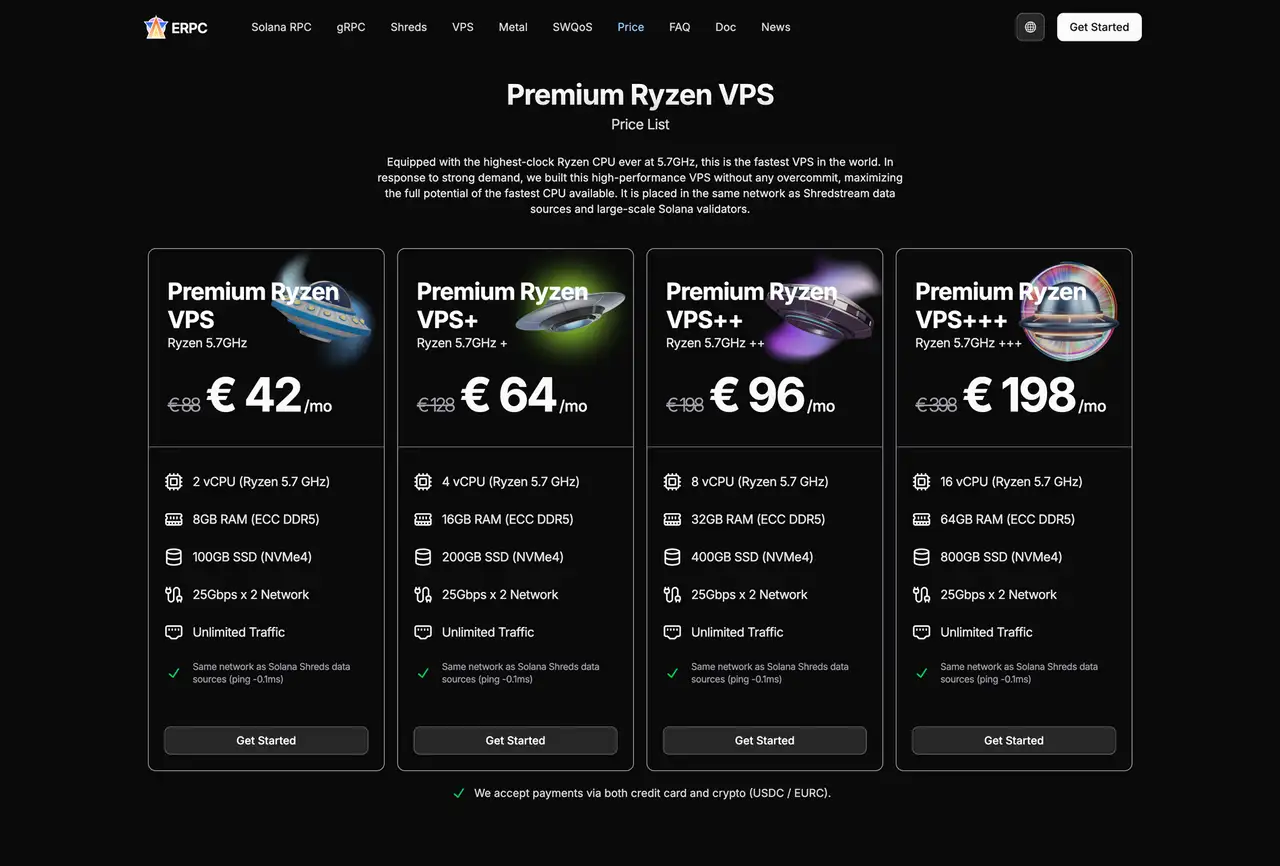
Key characteristics of Premium Ryzen VPS:
- 5.7GHz-class Ryzen CPU
- ECC DDR5 memory and NVMe4 storage
- 25Gbps × 2 networking
- Fully dedicated resources with no overcommit
- Zero-distance operation within the same network as Jito Block Engine, Shredstream nodes, and Geyser gRPC nodes
This provides near bare-metal performance with VPS flexibility and multi-region scalability.
The recent Shreds/gRPC upgrades directly benefit applications running on these VPS options, reducing latency and improving stability under heavy load.
The recent Shreds/gRPC upgrades directly benefit applications running on these VPS options, reducing latency and improving stability under heavy load.
Contact and Service Information
ERPC’s Solana RPC, Geyser gRPC, Shredstream, VPS, and Premium VPS plans are available through the Validators DAO official Discord.
- Validators DAO Official Discord: https://discord.gg/C7ZQSrCkYR
For service specifications, stock availability, dedicated setups, or special network requirements, please open a support ticket within the Discord server.
Challenges Addressed by ERPC and Validators DAO
- Transaction failures and latency fluctuations common in public RPC environments
- Performance limitations and overcommit issues from many infrastructure providers
- Significant impact of network distance on communication quality
- Difficulty for small projects to access high-quality Solana infrastructure
During the development of the Epics DAO Solana NFT card game project, we experienced firsthand the difficulty of accessing fast, high-quality Solana infrastructure.
This led us to build our own platform and, based on that operational knowledge, develop ERPC and SLV.
This led us to build our own platform and, based on that operational knowledge, develop ERPC and SLV.
Financial applications are especially mission-critical, where delays or errors directly affect user experience.
Solana development involves complex distributed validator structures, making it difficult for many teams to maintain stable performance.
Solana development involves complex distributed validator structures, making it difficult for many teams to maintain stable performance.
With upcoming technologies such as Alpenglow expected to accelerate block finalization and modernize the networking layer, ERPC and Validators DAO will continue adapting to support improved developer and user experience across the Solana ecosystem.
ERPC and SLV are positioned as core components of that mission.
ERPC and SLV are positioned as core components of that mission.
- ERPC Website: https://erpc.global
- SLV Website: https://slv.dev
- elSOL Website: https://elsol.app
- Epics DAO Website: https://epics.dev
- Validators DAO Official Discord: https://discord.gg/C7ZQSrCkYR


